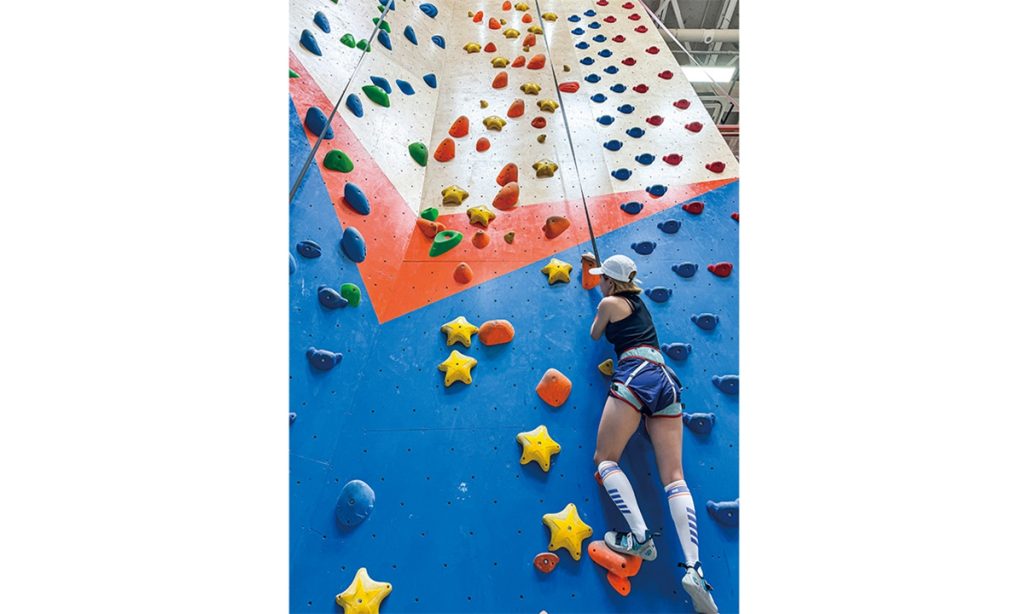Rock climbing’s popularity soars among Chinese youth inspired by Olympics

Rock climbing has become a go-to stress reliever for many young people, and its inclusion in the 2024 Paris Olympics has further fueled its appeal.
Chinese athlete Wu Peng's silver medal in the men's speed climbing event in Paris has sparked widespread interest, with his climbing videos attracting significant attention online. Many netizens expressed a newfound desire to try the sport themselves.
Puzzle-solving
Data from QianGua.com indicate that interactions related to rock climbing on Xiaohongshu, a Chinese lifestyle-sharing platform, reached 2.18 million posts in July 2024, and surged to 2.24 million from August 5 to August 11.
Climbing gyms across China have seen an uptick in bookings, especially on weekends and after-work hours on weekdays. Hao, manager of Upper Climbing Gym in Shenzhen, told the Global Times that there's a significant increase in visitors, while Chen, manager of Benchmark Climbing Gym in Shanghai, reported a rise in young climbers.
In response to the growing number of people trying rock climbing, more climbing gyms are being established. The "2023 China Rock Climbing Industry Analysis Report" released by Chinese Mountaineering Association (CMA) shows that the number of gyms reached 636 in 2023, surpassing the US for the first time. Hao noted that despite the heavy investment required, gyms like Upper Climbing Gym are planning expansions to meet the demand.
Unlike other sports, rock climbing's puzzle-solving element captivates many climbers. For instance, in bouldering, a discipline of indoor climbing, the same route can be completed using different movements, at varying speeds and levels of energy expenditure. Finding the most efficient way to reach the top is like solving an optimization problem, providing a strong sense of accomplishment.
Leo, an avid rock climbing enthusiast, told the Global Times that this sense of accomplishment is what draws him to the sport. "I'm not someone who enjoys repetitive exercises. In climbing, the change of placement, angle, or shape of a few holds can dramatically alter the route's strategy. Figuring out how to tackle these new challenges is part of what I enjoy."
Jessica, a long-time rock climbing enthusiast who currently works in Hong Kong, told the Global Times that every climber needs to learn how to deal with their own bodies, with the first step being learning how to "fall safely." "For beginners, false falls are common, so finding the right coach or community is important," she said.
Here lies the philosophy of rock climbing - it taps into a person's instincts. Rocky, an intermediate climbing instructor from Shanghai University of Sport, explained: "It's like rediscovering childhood memories, finding a pure 'flow' while climbing."
Climbing provides an exciting alternative to traditional gym workouts. It combines physical strength, flexibility, problem-solving ability, and mental focus, making it a holistic exercise.
Continued growth
Since making its Olympic debut at the 2020 Tokyo Games, sport climbing soon raised its profile globally and in China. The sport's inclusion in the Olympics has inspired many young Chinese to explore it as a competitive and recreational activity.
Rocky told the Global Times that sport climbing meets the emotional needs of urban professionals.
The popularity of sport climbing can be attributed to the influence of the Olympic Games, and the promotion on social media platforms such as Xiaohongshu. After a day of stressful work, office workers can find relief and excitement in climbing. The sport itself is very attractive and embodies a sense of freedom. The increasing number of climbing gyms and improved services have made it more accessible too, he said.
In addition, the "people-friendly" atmosphere at climbing gyms contributes to a positive experience. Climbers typically focus on their own routes, and when they hit a difficult point, others in the rest area will encourage them by saying something on the lines like "Just reach out and you've got it."
Nisa, a freshman in rock climbing, told the Global Times that she's not particularly extroverted and doesn't actively seek climbing partners.
"If I meet someone, great. If not, it's no big deal," she said, noting that the sport's somewhat introverted nature hasn't hindered the formation of a supportive community.
"Climbing can be a solo activity or a shared one," Chen, the manager in Shanghai, said, adding that the sport accommodates different social preferences.
Climbing also helps some people meet people who share similar interests. Climbers develop a shared understanding with their own "codes" and "lingo."
Jiang Yiyi, vice dean of the School of Leisure Sports and Tourism at Beijing Sport University, told the Global Times on Wednesday that as a trendy and youthful sport, rock climbing's popularity is expected to continue growing, and its industry chain is expanding rapidly despite certain challenges.
One of the main hurdles is the technical skills required and the associated risks, which create a barrier to entry for newcomers.
To address this, there is an ongoing effort to develop professional talent in the field, aiming to increase the number of skilled trainers in climbing institutions. This would not only promote the sport but also ensure its safe and sustainable growth, she noted.
In the face of intense competition within the industry, Zhang Shanshan, founder of Beijing Aosen Beiding Sports Management Company, told the Xinhua News Agency that to succeed in this market, industry insiders must first be clearly positioned and focus on enhancing professionalism and service for the customer base.
"The gym needs a diverse range of climbing routes. Professionals are in demand to continuously update the climbing routes in the facility so that each visit feels fresh and innovative," Zhang said.